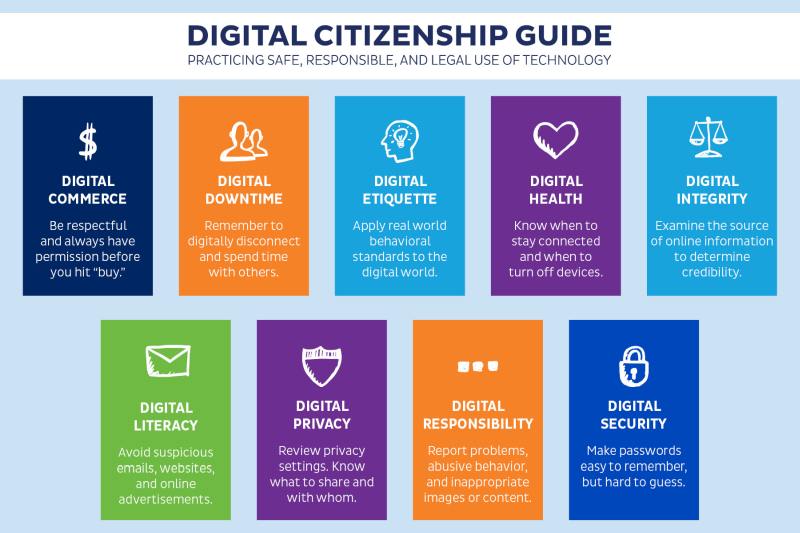Post 1: What is Digital Citizenship?
What is Digital Citizenship?
As stated by digitalcitizenship.net, "Digital Citizenship is a concept which helps teachers, technology leaders, and parents to understand what students/children/technology users should know to use technology appropriately. Digital Citizenship is more than just a teaching tool; it is a way to prepare students/technology users for a society full of technology."
Digital Citizenship is a relatively new concept to me. I was introduced to Digital Citizenship in one of the technology education courses I took for my education degree. I find it hard to remember when I couldn't access some digital device. I have been connected to the digital world, whether it was a cellphone, laptop, or gaming console. As I went through the education system, I was never taught about Digital Citizenship. Regarding technology, all our discussions were based on not trusting anyone online. This led me to ask when this concept first started to appear. And why discussions around Digital Citizenship are only now becoming more common. After some digging around the internet. I found that the concept of Digital Citizenship has been around since the early 1990s and has been evolving with technology ever since (Digital Respons-ability.net, 2022). This helped me understand why I experienced such a limited exposure to the concept as a student in the 2000s. Teachers taught us about digital citizenship then, but they could only teach what they knew.

Teaching About the Dark and Light Sides of Technology.
The light and dark sides of digital citizenship are primarily incorporated into my teaching. Mainly because I am the technology teacher in my school, I discuss both the light and dark sides of technology in my tech classes and my science and health classes. But overall, I primarily focus on the dark side, as it is the most important in a junior high school setting.
It is a fair assumption to say that most teachers have to deal with the dark side of technology in the classroom. We have all either experienced or heard of students having a negative experience online. The article Teens, Kindness and Cruelty on Social Network Sites states that "88% of social media-using teens have witnessed other people be mean or cruel on social network sites" and that "15% of social media-using teens say they have been the target of online meanness". I have seen firsthand the negative side of technology, where students have been bullied on social media apps such as Snapchat and Instagram. In my technology and health classes, I explain the importance of being a good person online for this reason.
References:
Digital Respons-ability.net, (2020, October 26) The defition of digital citizenship. Retrieved January 13, 2024, From https://respons-ability.net/definition-digital-citizenship/#:~:text=History%20of%20The%20Definition%20of,more%20technology%20came%20into%20classrooms.
Lenhart, A., Madden, M., Smith, A., Purcell, K., & Zickuhr, K. (2020, August 17). Teens, kindness and cruelty on social network sites. Pew Research Center: Internet, Science & Tech. Retrieved January 13, 2024, from https://www.pewresearch.org/internet/2011/11/09/teens-kindness-and-cruelty-on-social-network-sites/
Ribble, M. (2023). digitalcitizenship.net. Retrieved January 13, 2024, from https://www.digitalcitizenship.net



Comments
Post a Comment